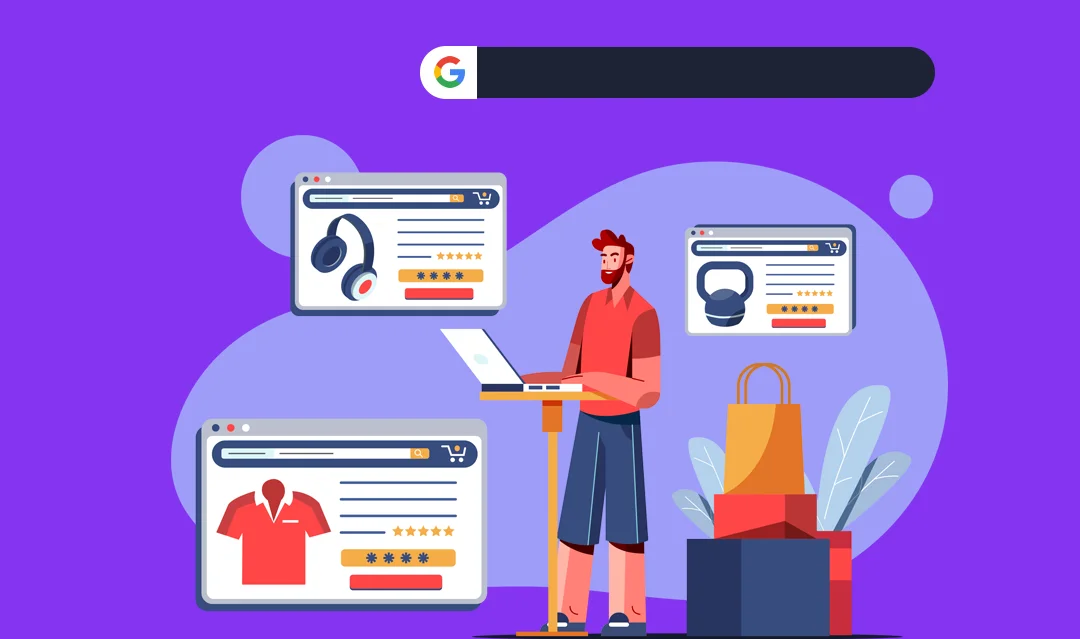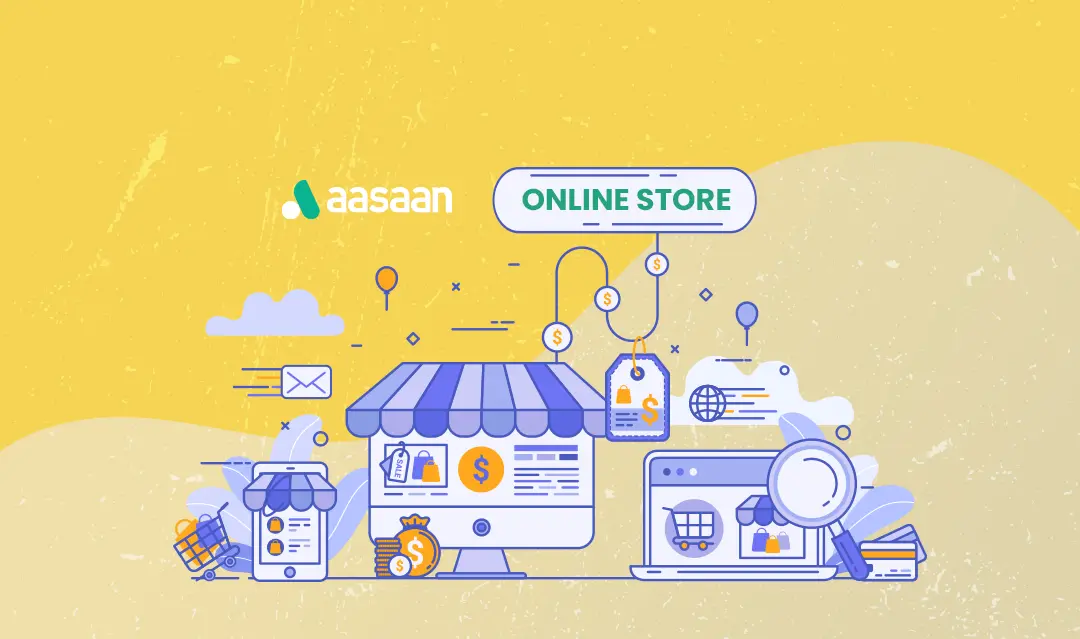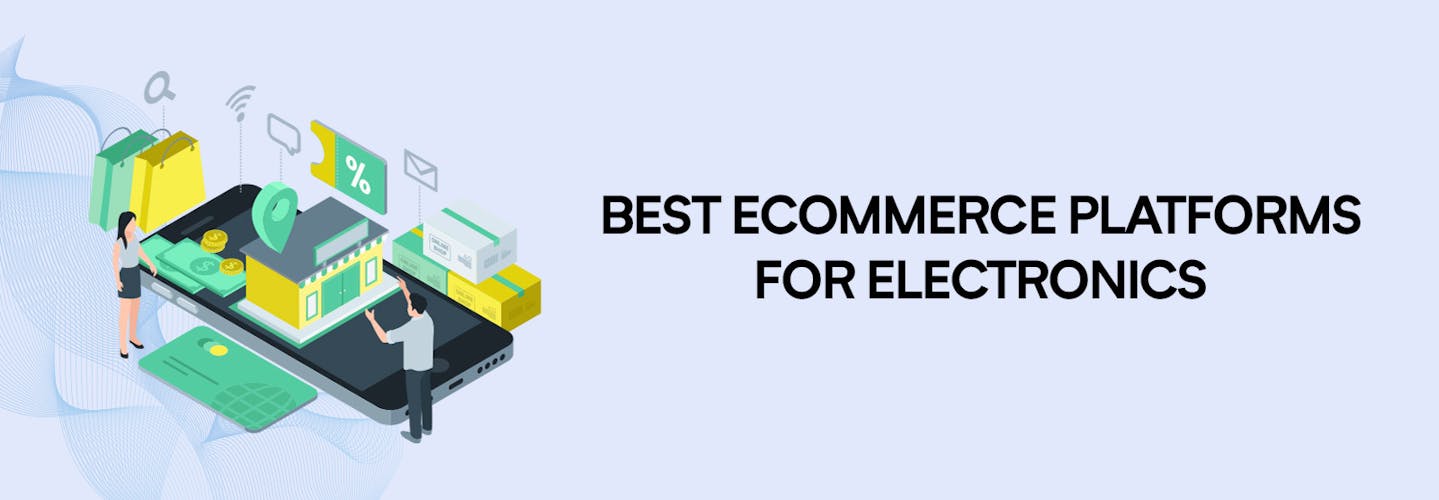
8 Best eCommerce Platforms For Electronics
In today’s digital age, the landscape of online electronics stores is growing at an unprecedented rate.
According to a report by Statista, the global consumer electronics e-commerce market reached an overall value of approximately 419 billion U.S. dollars in 2023.
This industry is expected to reach a market size of 511 billion U.S. dollars by 2025, with a forecasted compound annual growth rate (CAGR) of 10.5 percent with electronics being one of the top-selling categories.
With the advancement of technology, more and more people are turning to online shopping for their electronics needs.
From mobile phones to laptops, home appliances to gaming consoles, the variety of electronics available online is vast and ever-expanding.
This growth is fueled by the convenience of shopping from the comfort of one’s home, the availability of a wide range of products, and the competitive prices offered by online retailers.
Additionally, the COVID-19 pandemic has accelerated the shift towards online shopping, making it an integral part of our daily lives.
Why Choosing the Right eCommerce Platform Matters?
Selecting the right eCommerce platform is crucial for the success of an online electronics store.
The platform is the backbone of your online business, and it impacts everything from the user experience to the efficiency of your operations.
A well-chosen platform will provide a seamless shopping experience for your customers, offer advanced features and tools for managing your store, and enable you to scale your business as it grows.
Moreover, with the increasing competition in the online electronics market, choosing a platform that optimizes your store for search engines, provides robust security features, and offers comprehensive analytics is more important than ever.
The Role of eCommerce Platforms in Electronics Retail
ECommerce platforms play a pivotal role in the success of electronics retail businesses.
They provide the necessary infrastructure to set up and manage an online store, including product listings, shopping cart functionality, payment processing, and order management.
Additionally, eCommerce platforms offer a host of other features that are essential for electronics retailers, such as product reviews, detailed product descriptions, and high-quality images.
These features help customers make informed decisions and increase their confidence in purchasing from your store.
Furthermore, eCommerce platforms provide tools for marketing and promoting your products, managing your inventory, and analyzing your store’s performance.
Key Factors to Consider When Selecting an eCommerce Platform

When selecting an eCommerce platform for your electronics store, there are several key factors to consider:
- User-Friendly Interface: The platform should be easy to use for both you and your customers. A user-friendly interface will make it easier for you to manage your store and for your customers to navigate and make purchases.
- Customization and Flexibility: The platform should be customizable and flexible to accommodate the specific needs of your electronics store. This includes the ability to customize the design and layout of your store, add custom features and functionalities, and integrate with other tools and services.
- Scalability: As your business grows, your eCommerce platform should be able to scale with you. This means it should be able to handle an increasing number of products, customers, and transactions without affecting the performance of your store.
- SEO Features: Search engine optimization (SEO) is crucial for the success of your online store. The platform should offer SEO features that enable you to optimize your store for search engines, improve your visibility in search results, and drive organic traffic to your store.
- Mobile Responsiveness: With the increasing use of mobile devices for online shopping, it is essential that your store is mobile-friendly. According to my sources, the percentage of eCommerce sales on mobile devices is expected to account for 43.4% of total retail eCommerce sales in 2023. The platform should offer a responsive design that adapts to different screen sizes and provides a seamless shopping experience on mobile devices.
Read More: 8 Best Mobile friendly website builders.
- Payment and Shipping Options: The platform should offer a variety of payment and shipping options to cater to the preferences of your customers. This includes support for multiple payment gateways, flexible shipping rates, and the ability to ship to multiple locations.
- Security: Security is of utmost importance for online stores. The platform should provide robust security features to protect your store and your customers’ data from cyber threats.
- Customer Support: Good customer support is essential for the smooth operation of your online store. The platform should offer comprehensive customer support through various channels such as email, phone, and live chat.
Essential Features for Electronics eCommerce Platforms
In the world of online electronics retail, the eCommerce platform you choose can make or break your business.
But what features should you be looking for? Let’s dive into the essential features that can set your electronics eCommerce platform apart from the rest.
1. Scalability: Ensuring Room for Growth
Scalability is a must-have feature for any eCommerce platform, especially in the electronics sector.
According to a report by Oberlo, the global eCommerce growth rate for 2023 is forecast at 8.9%, bringing global eCommerce sales worldwide to $5.8 trillion. Ecommerce’s growth rate worldwide is expected at 9.4% in 2025, before decelerating slightly to 8.6% in 2025.
Your platform should be able to handle an increasing number of products, customers, and transactions without affecting the performance of your store.
This ensures that as your business grows, your platform grows with you, allowing you to capitalize on new opportunities without worrying about technical limitations.
2. Security: Protecting Payment Transactions
Security is non-negotiable when it comes to online retail. With cybercrime rates on the rise—expected to cost the world $10.5 trillion annually by 2025 according to Cybersecurity Ventures—your eCommerce platform must offer robust security features.
This includes SSL certificates, data encryption, and secure payment gateways to protect both your business and your customers from fraud and data breaches.
3. User Reviews: Gaining Insights from Others
User reviews are a goldmine of information and can significantly influence purchasing decisions.
A study by Spiegel Research Center found that nearly 95% of shoppers read online reviews before making a purchase.
Your eCommerce platform should allow customers to easily leave and read reviews, helping you build trust and providing valuable insights into customer needs and preferences.
4. SEO Tools and Resources: Boosting Online Visibility
Search Engine Optimization (SEO) is crucial for the success of your online store.
According to BrightEdge, over 53% of all website traffic comes from organic search.
Your eCommerce platform should offer a range of SEO tools and resources, such as keyword optimization, meta descriptions, and URL structuring, to help you improve your search engine rankings and drive organic traffic to your store.
5. Multi-Channel Sales: Expanding Your Reach
In today’s competitive market, relying solely on your online store for sales can limit your reach.
Your eCommerce platform should support multi-channel sales, allowing you to sell your products on various platforms like Amazon, eBay, and social media, thereby expanding your reach and increasing your sales opportunities.
6. Pricing and Customization: Tailoring to Your Needs
Every business is unique, and your eCommerce platform should reflect that. It should offer flexible pricing options and customization features that allow you to tailor the platform to fit the specific needs of your electronics store.
Whether it’s custom themes, plugins, or API integrations, the ability to customize your store can give you a competitive edge.
7. Analytics and Reporting: Tracking Performance Metrics
Data is the lifeblood of any successful eCommerce operation. According to a report by Forrester, companies that leverage data-driven insights are expected to take $1.8 trillion annually from less-informed peers by 2023.
Your platform should offer comprehensive analytics and reporting features that allow you to track key performance metrics like sales, customer behavior, and website traffic.
This data can provide valuable insights into your business, helping you make informed decisions and optimize your store for success.
10 Best eCommerce Platforms For Electronics
1. Aasaan App Unlock the Power of E-Commerce
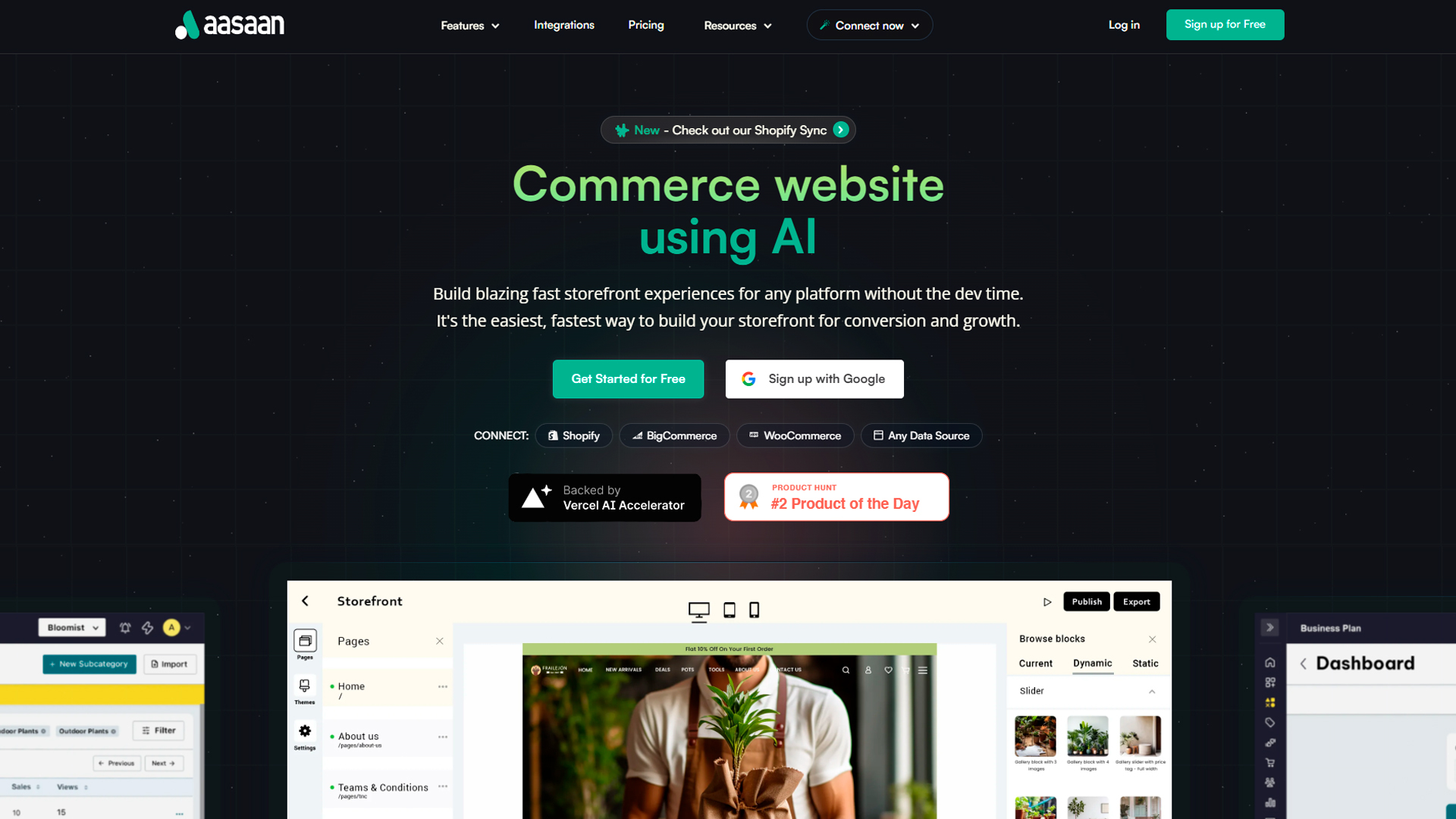
Overview: Aasaan is a no-code Headless SaaS platform designed for SMEs to build storefronts and mobile apps using a template-driven front-end.
It allows businesses to visually build next-generation shopping experiences without any coding.
Aasaan seamlessly integrates with your existing backend or starts with its API-first commerce platform, enabling you to create rich, dynamic shopping experiences.
Pricing:
- Premium plan: For merchants and startups to help grow business with branding. It costs $50 per month if billed annually or $65 per month if billed monthly.
- Business plan: Enables advanced merchants with advanced features. It costs $165 per month if billed annually or $200 per month if billed monthly.
- Enterprise plan: Unlimited scalability, greater control, and dedicated resources for D2C brands to scale. It requires you to contact sales for a custom quote.
Key Features:
- User-friendly interface
- Drag-and-drop builder
- Multiple payment gateway integrations
- SEO-friendly design
- Mobile-responsive templates
- Inventory management
- Customer support etc.
Aasaan provides a platform that seamlessly integrates with your existing backend or allows you to start with their API-first commerce platform.
You can build using drag & drop, deploy & go live with a custom domain, and manage your business all from one place.
Additionally, Aasaan offers seamless integrations to your headless storefront, allowing you to expand the capabilities of your store and boost your business growth.
For more information, you can explore their website or book a demo here.
2. BigCommerce Suited for Larger Electronic Businesses
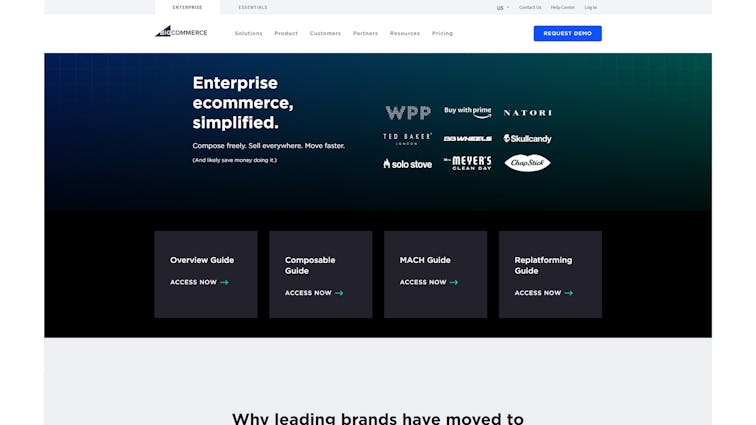
Overview: BigCommerce is a leading eCommerce platform designed to cater to the needs of larger electronic businesses. It offers a range of advanced features and tools that help businesses manage their online store, optimize their operations, and scale their business.
Pricing: BigCommerce offers four pricing plans:
- Standard: $29.95/month
- Plus: $79.95/month
- Pro: $299.95/month
- Enterprise: Custom pricing
Key Features:
- Scalable platform
- Multi-channel selling
- Advanced SEO tools
- Comprehensive analytics
3. Shopify Design Flexibility and User-Friendly Interface

Overview: Shopify is a popular eCommerce platform known for its design flexibility and user-friendly interface. It offers a range of customizable templates and design options that help businesses create a professional and visually appealing online store.
Pricing: Shopify offers three main pricing plans:
- Basic Shopify: $29/month
- Shopify: $79/month
- Advanced Shopify: $299/month
Key Features:
- Drag-and-drop store builder
- Mobile responsive themes
- Secure payment gateways
- Inventory management
- SEO and marketing tools
4. Wix Affordable Option for Start-ups and Small Businesses
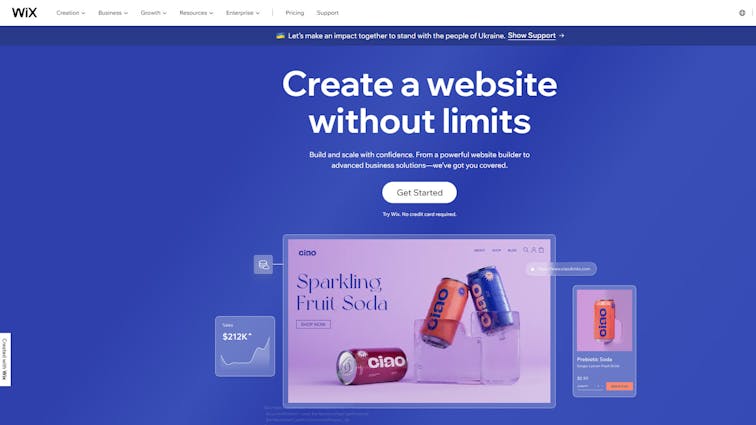
Overview: Wix is an affordable eCommerce platform that is ideal for start-ups and small businesses. It offers a range of features and tools that help businesses create and manage their online store with ease.
Pricing: Wix offers three eCommerce pricing plans:
- Business Basic: $23/month
- Business Unlimited: $27/month
- Business VIP: $49/month
Key Features:
- Drag-and-drop website builder
- Customizable templates
- Mobile optimized design
- Secure online payments
- Product galleries and collections
- 24/7 customer support
5. Volusion Customization Features for Branding
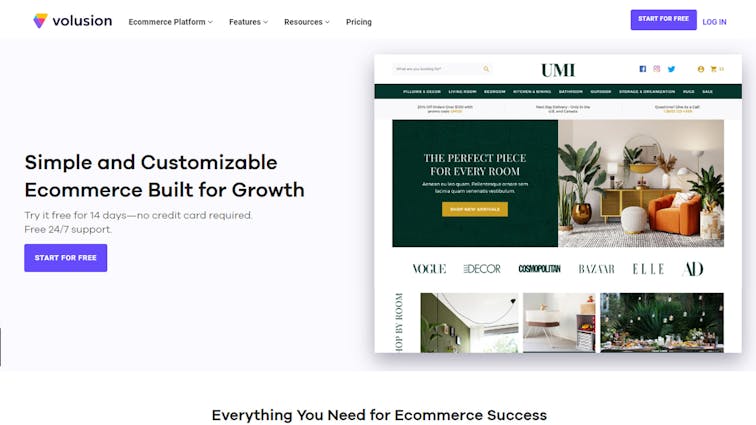
Overview: Volusion is an eCommerce platform that offers a range of customization features that help businesses create a unique brand identity. It provides a variety of design options, plugins, and integrations that allow businesses to tailor their online store to their specific needs.
Pricing: Volusion offers four pricing plans:
- Personal: $29/month
- Professional: $79/month
- Business: $299/month
- Custom: Custom pricing
Key Features:
- Customizable design options
- Product variants and options
- Secure payment processing
- SEO and marketing tools
- Comprehensive analytics
- Payment processing
- Inventory management
- Social media integration
- Drag-and-drop website builder
6. Squarespace Professional Template Design for Sophistication
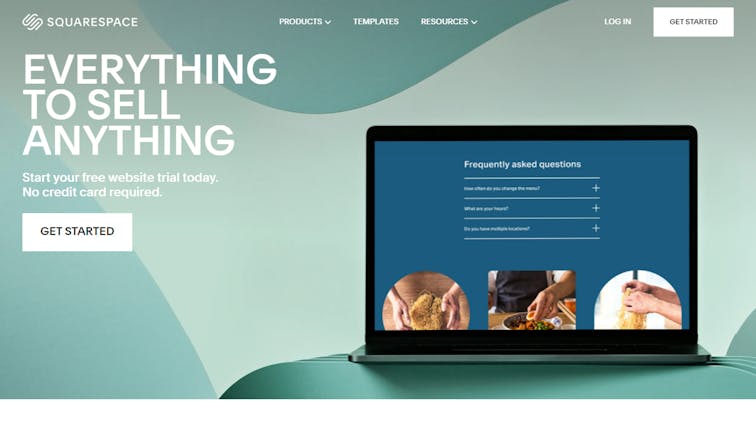
Overview: Squarespace is an eCommerce platform known for its professional template designs and sophisticated aesthetics. It offers a range of design options and features that help businesses create a visually appealing and professional online store.
Pricing: Squarespace offers four pricing plans:
- Personal: $16/month
- Business: $26/month
- Basic Commerce: $35/month
- Advanced Commerce: $54/month
Key Features:
- Professional templates
- Drag-and-drop design
- Mobile optimized design
- Secure payment processing
- Inventory management
- 24/7 customer support
7. Magento Catering to Various Business Types
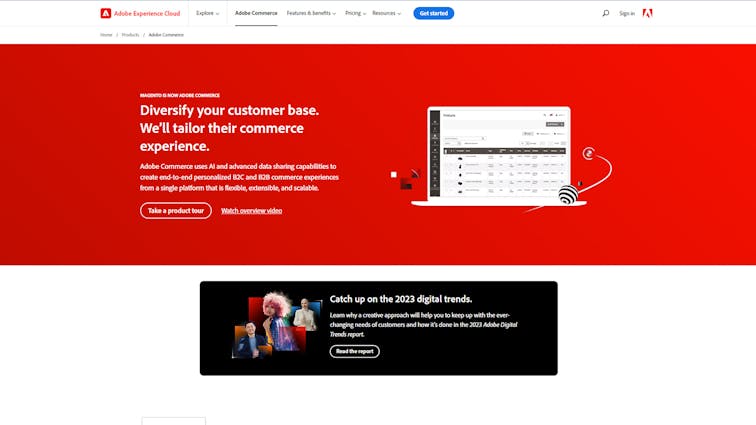
Overview: Magento is a flexible eCommerce platform that caters to various business types, from small start-ups to large enterprises. It offers a range of features and tools that help businesses manage their online store, optimize their operations, and scale their business.
Pricing: Magento offers two main pricing options:
- Magento Open Source: Free
- Magento Commerce: Custom pricing
Key Features:
- Flexible and customizable
- Scalable platform
- Secure payment processing
- Advanced SEO tools
- Comprehensive analytics
8. Weebly Affordability and User-Friendly Design

Overview: Weebly is an affordable and user-friendly eCommerce platform that is ideal for small businesses and start-ups. It offers a range of features and tools that help businesses create and manage their online store with ease.
Pricing: Weebly offers three pricing plans:
- Pro: $12/month
- Business: $25/month
- Business Plus: $38/month
Key Features:
- Drag-and-drop website builder
- Customizable templates
- Mobile optimized design
- Secure payment processing
- SEO and marketing tools
Conclusion:
Choosing the right eCommerce platform for your business is vital, and several factors come into play during decision making. The right platform not only boosts your online presence but also simplifies business operations and helps in scaling. Ensure your choice is a good fit for your business’s specific needs, budget, and scalability. You can understand these eCommerce platforms better, leverage their trials or demos, and make a well-informed decision that best suits your brand’s requirements.



